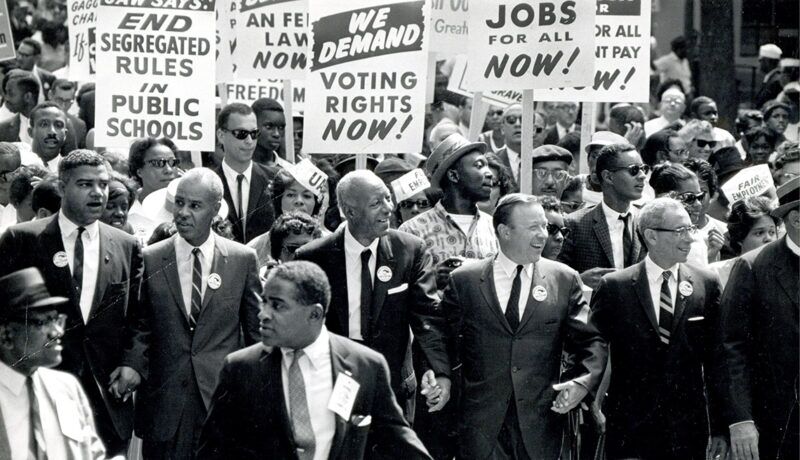The Civil Rights Era (1965 – 2000)
Following the groundbreaking Supreme Court decisions that introduced the principle of “one person, one vote” and passage of the Civil Rights Act of 1964 and the Voting Rights Act of 1965, the country experienced a kind of golden age of civil rights that included passage of several pieces of federal legislation that made it easier for different groups of people to vote. This period effectively ended with the voter purges in Florida that quite possibly changed the outcome of the 2000 presidential election. Nevertheless, we’ve included the second 25-year extension of the Voting Rights Act as a fitting if somewhat symbolic marker for the end of this golden age.
We should clarify that at this point the right to vote extended to all US citizens in the 50 states and the District of Columbia, but the four million US citizens living on five US territories – Puerto Rico, Guam, the US Virgin Islands, American Samoa, and the Northern Mariana Islands – were and still are barred from voting for president in the general election. And the territories and the District still lack full representation in Congress.
1971
Voting age lowered to 18 years old
Ratification of the 26th Amendment to the U.S. Constitution lowered the voting age to 18. The amendment was largely a result of Vietnam War protests demanding a lowering of the voting age on the premise that people who are old enough to fight are old enough to vote.
1975
Translation of voting materials required
In renewing the federal Voting Rights Act for a second time time, Congress added a requirement for the translation of voting materials in areas with large numbers of citizens with limited English language skills. The goal was to make it easier for citizens who were non-native English speakers to vote.
1982
Voting Rights Act extended 25 years
After twice renewing the VRA, Congress extended it for 25 years. It also amended the Voting Rights Act to permit finding of discrimination without proof that the state specifically intended to discriminate
1982
Consent Decree Gives Federal Court Oversight of Ballot Security Measures
A 1981 lawsuit brought by the Democratic National Committee against the Republican National Committee alleged that the RNC and the Republican State Committee of New Jersey had engaged in voter intimidation tactics during that year’s gubernatorial election. Among other tactics, Democrats alleged that the RNC had employed off-duty police to patrol mostly minority-populated voting precincts, that these off-duty police wore armbands that read “National Ballot Security Task Force”, and that some of these off-duty police wore guns that were visibly displayed.
The suit was settled in 1982 when a federal judge approved a consent decree between the RNC and the DNC in which the RNC agreed to refrain from undertaking the kinds of ballot security activities alleged in the lawsuit. The consent decree also required a federal court to approve any activity by the RNC related to proposed ballot security activities. The decree was updated twice by the courts, which also rejected several requests by the RNC over the next 30 years to terminate the decree.
1984
Voting made easier for people with disabilities
Congress passed the Voting Accessibility for the Elderly and Handicapped Act which requires polling places to be accessible to people with disabilities.
1986
Voting made easier for military personnel and US citizens living abroad
Passage of the Uniformed and Overseas Citizens Absentee Voting Act made it easier for members of the US Uniformed Services and merchant marine, their family members, and US citizens living overseas to register to vote and to obtain absentee ballots.
1993
Voter registration made easier
The National Voter Registration Act, also known as the Motor Voter Act, requires states to permit mail-in registration, and it makes registration services available at the DMVs, unemployment offices, and other state agencies.
2002
Provisional ballots mandated for federal elections
The Help America Vote Act, reflecting the recommendations of the National Commission on Federal Election Reform established in the wake of anomalies in the 2000 presidential election, requires states to provide a provisional ballot to any voter who claims eligibility but whose name can’t be found on the voter registration rolls.
2006
A last hurrah for the Voting Rights Act
On signing the second 25 year extension to the Voting Rights Act, President George W. Bush said to applause, “My administration will vigorously enforce the provisions of this law, and we will defend it in court.”


